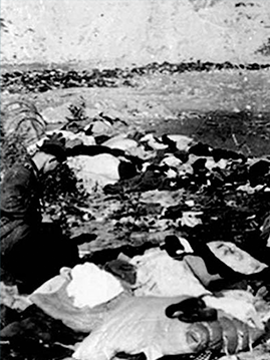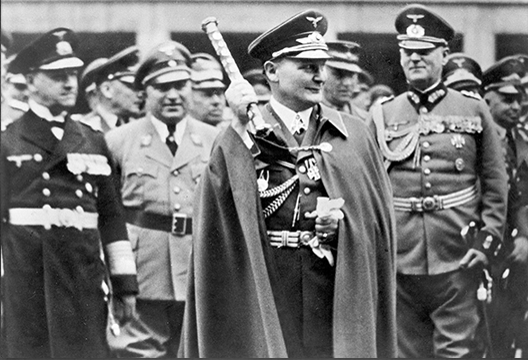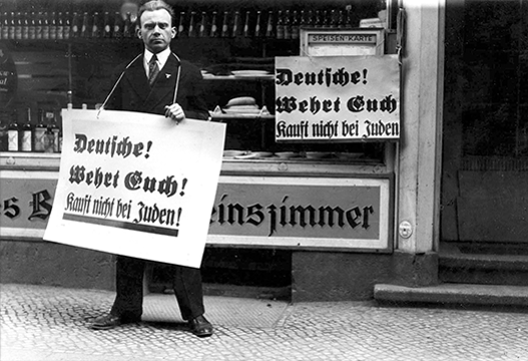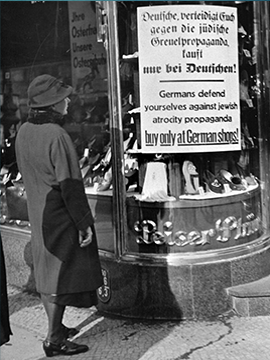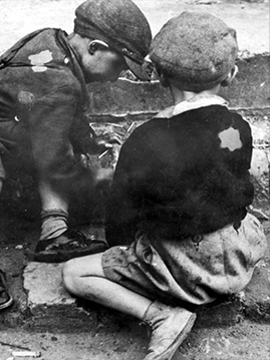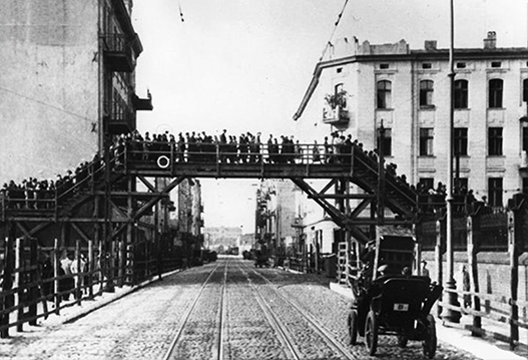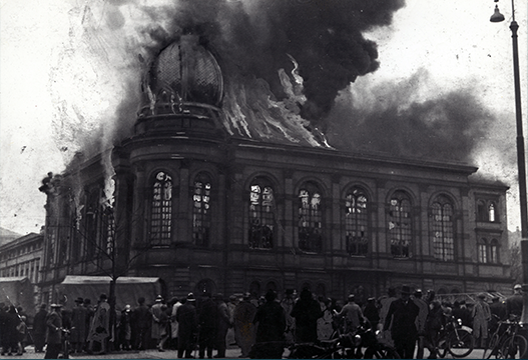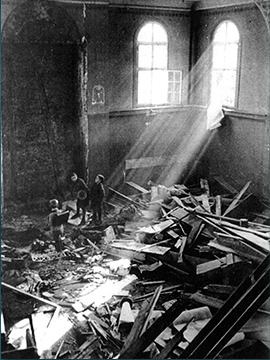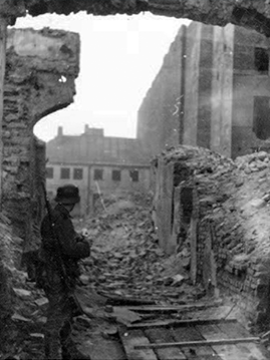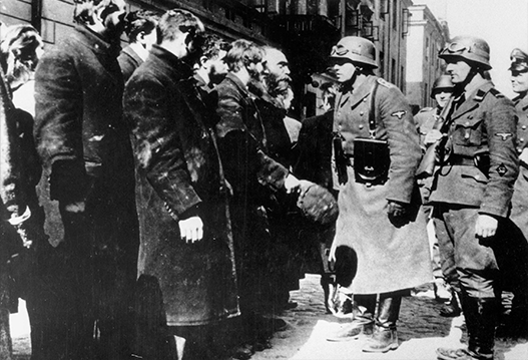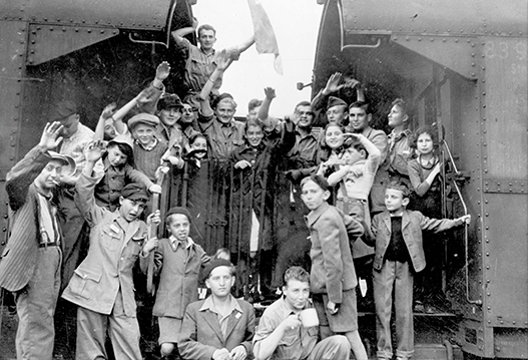Password:
Skip to Content
-
- 1933
- 1934
- 1935
- 1936
- 1937
- 1938
- 1939
- 1940
- 1941
- 1942
- 1943
- 1944
- 1945
Designed as a resource for students, this timeline chronicles key dates in the history of the Holocaust from 1933-1945. Click on specific events to deepen your learning with additional information and primary source materials.
Teachers can click the  icon in the upper right corner to find resources that can support classroom instruction.
icon in the upper right corner to find resources that can support classroom instruction.
January 30 1933
Adolf Hitler becomes chancellor of Germany
February 27 1933
Reichstag arson leads to state of emergency
March 5 1933
Reichstag elections: the Nazis gain 44 percent of the vote
March 22 1933
First concentration camp is established in Dachau, Germany
March 24 1933
The Nazis sponsor the Enabling Act
April 1 1933
The Nazis declare a boycott of all Jewish businesses in Germany
April 7 1933
Civil Service Reform – Jews are barred from working in the civil service and are stripped of their equal rights
April 25 1933
School quota system limits the number of Jewish high school and university students in Germany
May 6 1933
Persecution of Jewish researcher, Magnus Hirschfeld, noted expert on sex, sexuality and gender norms
May 10 1933
The Nazis burn thousands of anti-Nazi, Jewish-authored, and other books
July 14 1933
Forced sterilization of German citizens with congenital disabilities begins
July 14 1933
Germany is proclaimed a one-party state
October 14 1933
Germany quits League of Nations and disarmament talks
November 12 1933
The Nazi Party gets 92 percent of the vote in one-party elections
January 26 1934
German-Polish non-aggression pact
June 30 1934
“The Night of the Long Knives”
August 2 1934
German President Hindenburg dies
September 6 1934
Gestapo compiles list of gay men
January 13 1935
Germany reclaims the Saar region
March 16 1935
Military conscription in Germany begins
April 1 1935
Jehovah’s Witnesses refuse military draft
May 31 1935
Jewish people are no longer allowed to serve in the German armed forces
September 1 1935
Paragraph 175 of the Criminal Code is amended to criminalize homosexuality
September 15 1935
Nuremberg Laws enacted
November 14 1935
Nuremberg Laws are expanded to include Roma and other groups
March 7 1936
The Germans enter the Rhineland
July 17 1936
The Spanish Civil War begins
August 1 1936
The Summer Olympic Games begin in Berlin
September 9 1936
The Four Year Plan is unveiled
October 25 1936
The Rome-Berlin Axis Agreement is signed between Italy and Germany based on political interests
November 25 1936
Germany and Japan sign a military pact
March 21 1937
Pope Pius XI responds to German racist policies
July 19 1937
Buchenwald concentration camp is established in Germany
March 11 1938
The Anschluss –The Annexation of Austria by Nazi Germany
April 4 1938
Gay men sent to concentration camps
June 14 1938
Jewish businesses have to register as Jewish
July 6 1938
Anti-Jewish economic policies restrict Jews’ access to many fields of activity
July 6 1938
The Evian Conference
August 17 1938
Compulsory middle names for Jews in Germany are required in order to identify them as Jews
September 29 1938
The Munich Agreement: Great Britain and France accept German annexation of parts of Czechoslovakia
October 5 1938
Passports of German Jews are marked with the letter “J”
October 28 1938
17,000 Polish-born Jews are expelled from Germany to Poland; most are interned in Zbaszyn
November 9 1938
Kristallnacht Pogrom
November 10 1938
Italy adopts antisemitic racial laws
November 12 1938
Nazi leaders enact new laws to economically remove Jews from society
November 15 1938
Jewish children are banned from public schools
December 2 1938
First Kindertransport arrives in Great Britain
March 15 1939
The Germans occupy Bohemia and Moravia
March 28 1939
The civil war in Spain ends
June 6 1939
The MS St. Louis, a ship with 936 Jewish refugees, is turned away by Cuba, the United States, and other countries
August 18 1939
Beginning of the Euthanasia (T4) program
August 23 1939
Germany and the Soviet Union sign a non-aggression pact
September 1 1939
Germany invades Poland, beginning World War II
September 3 1939
Great Britain, France, India, Australia, Canada, South Africa, and New Zealand declare war on Germany
September 17 1939
The Soviets invade Poland
September 21 1939
Establishment of Jewish councils and the concentration of Jews into the larger cities of Poland
September 28 1939
Poland is divided between Germany and the Soviet Union
October 4 1939
The Warsaw (Poland) Jewish Council is established
October 7 1939
Jewish “resettlement” in the Lublin district of Poland begins; plans are made to establish a Jewish “reservation”
October 8 1939
The first ghetto is established in Piotrkow Trybunalski, Poland
October 26 1939
Civil administration (Generalgouvernement) is established in Poland
November 23 1939
Jews in Poland are required to wear the Jewish Badge (Star of David)
December 2 1939
The Nazis initiate use of gas vans to eliminate German patients with mental disabilities
January 24 1940
Jewish property in the Generalgouvernement is registered
April 9 1940
Germany invades Denmark and Norway
April 30 1940
The Lodz ghetto is sealed
May 10 1940
Germany invades Belgium and the Netherlands; Winston Churchill becomes Prime Minister of England
May 26 1940
The Allies evacuate forces to England at Dunkirk
June 14 1940
Germany occupies Paris
June 14 1940
The deportation of Polish political prisoners to Auschwitz concentration camp begins
July 10 1940
The Vichy France government is formed
August 13 1940
The Battle of Britain begins
September 7 1940
The German “Blitz” on England reaches a climax with massive air raids on British cities
October 3 1940
The Vichy government establishes anti-Jewish legislation, the Statut des Juifs
November 15 1940
The Warsaw ghetto is sealed
March 20 1941
The Krakow ghetto in Poland is sealed
April 6 1941
Germany invades Yugoslavia and Greece
April 24 1941
The Lublin ghetto is sealed
June 6 1941
Wehrmacht issues the “Commissar Order”
June 22 1941
Operation Barbarossa: The German invasion of the Soviet Union
June 23 1941
The Einsatzgruppen begin mass killings in the Soviet Union
June 28 1941
The Romanian “Iron Guard” kills 1,500 Jews in Iasi, Romania
June 30 1941
Germany occupies Lvov, Poland; 4,000 Jews are killed
July 1 1941
Einsatzgruppe D begins operating in Bessarabia (Romania); 160,000 Jews are murdered
July 8 1941
The systematic murder of the Jews of Vilna (Lithuania) begins at Ponary, south of Vilna
July 24 1941
The Kishinev (Moldova) ghetto is established
July 31 1941
Hermann Goering orders Heydrich to plan the “Final Solution”
August 1 1941
50,000 Jews are confined in the Bialystok (Poland) ghetto
August 24 1941
The “Second Phase” of the Euthanasia (T4) program begins
September 3 1941
The first experimental gassings are conducted at Auschwitz
September 8 1941
The siege of Leningrad (Russia) begins
September 15 1941
Romanian authorities deport 150,000 Jews to Transnistria; approximately 90,000 die
September 19 1941
German Jews are ordered to wear the Jewish Badge
September 29 1941
33,771 Jews are murdered at Babi Yar near Kiev (Ukraine) by members of Einsatzgruppe C
October 1 1941
The first transport (of prisoners of war) reaches Majdanek (Poland) extermination camp
October 15 1941
Deportation of German and Austrian Jews to ghettos in the East begins
October 28 1941
Germans murder thousands of Kovno (Lithuania) Jews
November 5 1941
Roma deported from Germany and Austria
November 24 1941
A ghetto is established in Theresienstadt, near Prague (former Czechoslovakia)
November 30 1941
30,000 Riga (Latvia) Jews are arrested and subsequently shot in the Rumbula Forest
December 7 1941
The Japanese surprise attack the American Naval base at Pearl Harbor, Hawaii, then a US territory
December 7 1941
The German army issues “Night and Fog” order
December 8 1941
The United States enters World War II
December 8 1941
Killing operations begin at Chelmno (Poland) extermination camp
December 31 1941
The Jewish underground in Vilna issues a partisan manifesto calling for resistance
January 16 1942
Germans begin deportation of Jews from Lodz to Chelmno
January 20 1942
The Wannsee Conference takes place
January 21 1942
The Jewish military underground is established in Vilna
March 17 1942
Belzec extermination camp begins functioning
May 3 1942
The first mass killing of Jews in Sobibor extermination camp occurs
May 27 1942
The Czech underground assassinates Reinhard Heydrich
June 2 1942
The BBC announces 700,000 Jews have been killed in Poland
June 22 1942
Auschwitz-Birkenau receives the first deportation of Jews from Drancy transit camp
July 16 1942
The Vél d’Hiv Roundup in France Begins
July 19 1942
Himmler orders elimination of all Jews in the Generalgouvernement
July 22 1942
The mass deportation from the Warsaw ghetto to Treblinka extermination camp begins
July 28 1942
The Jewish Fighting Organization (Z.O.B.) is founded in Warsaw
August 8 1942
The US receives information on a plan to annihilate Jews but delays publication to verify sources
September 12 1942
The Battle of Stalingrad begins
November 8 1942
The Allies invade North Africa
December 17 1942
The Allies condemn German mass murder
January 18 1943
Jews launch an armed resistance to deportations from the Warsaw ghetto
February 2 1943
The German army surrenders at Stalingrad
February 26 1943
The first transport of Sinti-Roma reaches Auschwitz-Birkenau
April 19 1943
The Warsaw Ghetto Uprising begins
April 19 1943
The Bermuda Conference convenes
July 10 1943
The Allies invade Sicily
August 2 1943
The uprising at Treblinka begins
September 1 1943
The Vilna underground uprising fails
September 23 1943
The Vilna ghetto is liquidated
October 1 1943
Danish Jews are rescued
October 14 1943
The uprising at Sobibor begins
November 3 1943
Germans launch Operation Harvest Festival (Erntefest)
January 22 1944
The War Refugee Board is established
March 19 1944
German troops occupy Hungary
March 24 1944
President Roosevelt warns Hungary to refrain from anti-Jewish measures
April 16 1944
Hungarian government registers Jews and confiscates their property
May 15 1944
Mass deportations of Hungarian Jews to Auschwitz-Birkenau begin
June 6 1944
D-Day (Invasion of Normandy)
June 23 1944
The Red Cross visits Theresienstadt
July 20 1944
An attempt to assassinate Hitler fails
July 25 1944
The Soviet Army liberates Majdanek
August 7 1944
The liquidation of the Lodz ghetto begins
September 20 1944
Churchill announces formation of Jewish Brigade
October 3 1944
The Polish uprising in Warsaw is crushed
October 7 1944
The Sonderkommando uprising at Auschwitz-Birkenau occurs
November 25 1944
Himmler orders gassings to stop at Auschwitz-Birkenau
December 16 1944
The Battle of the Bulge
January 17 1945
The Soviets conquer half of Budapest
January 17 1945
The Germans begin “Death March” from Auschwitz-Birkenau
January 27 1945
The Soviets liberate Auschwitz-Birkenau
April 11 1945
United States Army liberates Buchenwald
April 12 1945
President Roosevelt dies
April 15 1945
British forces liberate Bergen-Belsen concentration camp
April 28 1945
Mussolini is shot
April 30 1945
Adolf Hitler and Eva Braun commit suicide
May 2 1945
The Soviets occupy Berlin
May 7 1945
Germany surrenders to the Allies
May 8 1945
V-E (Victory in Europe) Day
July 16 1945
The Potsdam Conference
August 6 1945
The United States drops atomic bombs on Hiroshima and Nagasaki
August 15 1945
V-J (Victory over Japan) Day
September 20 1945
Paragraph 175 – criminalizing homosexuality – remains in effect
November 20 1945






